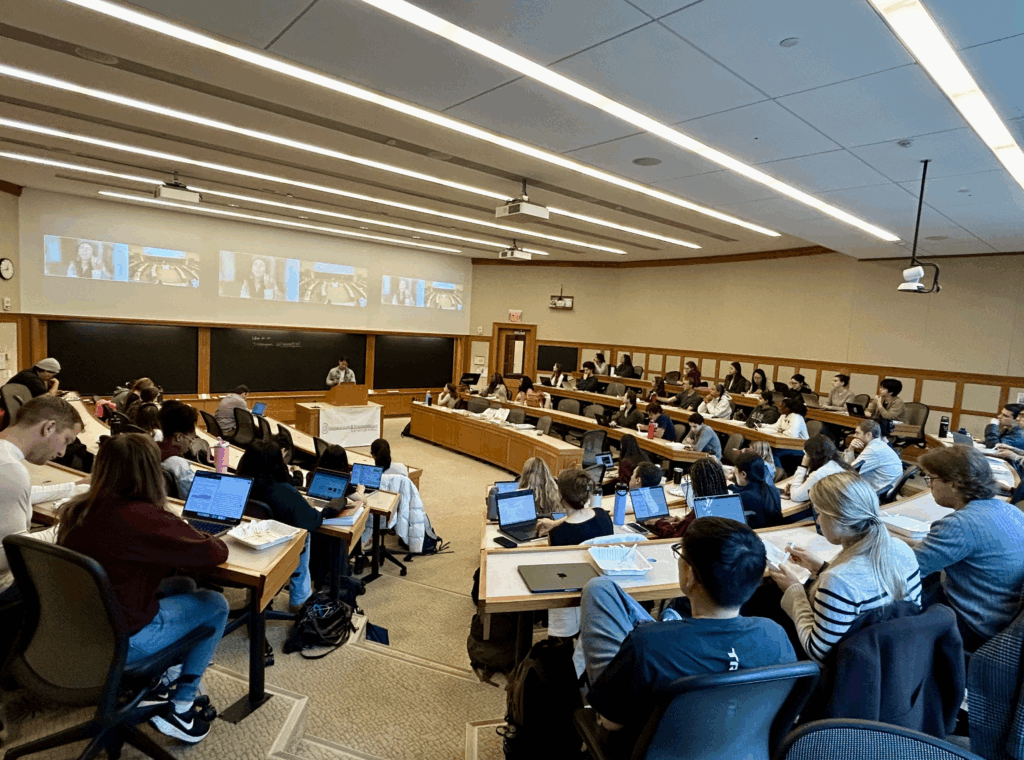
Written by Rachel Barkin
On October 20, 2025, JSEL hosted a lunch talk with Emma Raviv, an HLS alum and current in-house litigator at Spotify. Raviv specializes in copyright litigation and before working at Spotify, worked at Kirkland & Ellis, PBS NewsHour, and the U.S. Copyright Office.
Reflecting on her time at HLS, Raviv shared her favorite classes and how they informed her career in copyright litigation. She said that Professor Fisher’s copyright course set off a fire in her, inspiring her passion in copyright law. After her first-year, she spent her summer at Marvel Comics. In her second-year, she took the Cyberlaw Clinic, which she said was pivotal in her career. She was also on the Journal of Law and Technology’s board and enjoyed discussing with her peers important topics in technology and intellectual property. Taking Dale Cendalli’s copyright course was a helpful window into seeing what copyright litigation would look like at a law firm.
Raviv found that both doctrinals and seminars helped train her brain, even if she does not cite cases from those classes today. She loved Constitutional Law and First Amendment law, especially seeing the history behind the law today. For students considering classes to prepare for a career in copyright litigation, she said that a balance between doctrinal classes and seminars is helpful.
She said that her path from big law to in-house legal work is unconventional. She left private practice after only one year and 11 months because she wanted to try something new. She said that it is more conventional to work at a law firm for about four to six years, then try to go in-house, such as joining the general counsel of a client that you worked for at the firm. She decided to take a different path, seeking out a government role, because it was interesting to her. She chose her passion, and was still able to get in-house offers at smaller places after leaving government. She ended up working in a transactional role in a small public media company. It was a legal team of three and it was a really exciting role. After four years, she pivoted to working at Spotify, after seeing a job posting, because it was a role that is technology-forward and involved significant copyright work. She said she is proof that you do not have to spend six years at a firm, although that is most common.
At Spotify, Raviv said the General Counsel is in the rooms for strategic talks about where the company is going. She said that the General Counsel weighs in both for risk assessment and litigation strategy if there is a dispute. As for risk assessment, the General Counsel weighs in on anything that is legally relevant to the business strategy of the company. There are multiple departments underneath the General Counsel; she is in litigation and legal risk. Other subgroups include the product side, which handles music, podcasts, audio books, and experiences and partnerships. There are also lawyers that handle advertisement deals. There are both litigators and transactional attorneys. She said it is exciting that litigation oversees all business activity and ensures that everything is running smoothly. It allows her to have insight into the other groups and whether there may be potential legal issues.
She said that the litigation role at a law firm is completely different from being in-house. The in-house role requires more overall management. On large litigation matters, there are one or more law firms that handle the on-the-ground litigation work such as parsing through local rules of a court. However, the in-house counsel is still very involved in the case and contributes to legal strategy, such as discussing potential settlement and whether document production has privilege issues.
Raviv noted that a big issue in copyright law is artificial intelligence. There has been a pause because many people are waiting for big opinions on copyright law and fair use to trickle through the courts. Some litigation has progressed significantly, such as Bartz v. Anthropic and Kadrey v. Meta, but there is still uncertainty. Spotify, like many companies, are paying close attention to these federal court proceedings. Her job is to stay up-to-date on cases and summarize them to legal and business stakeholders, as well as engineers, because it impacts several aspects of business. During this uncertain time, companies have to make acceptable business risks and evaluate what other companies are doing.
